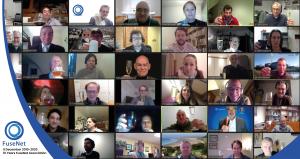Education network celebrates 10 years
A lot of active and former members joined the virtual party, including Niek Lopes Cardozo and Roger Jaspers, both professors at Eindhoven University, and professors emeriti Jean-Marie Noterdaeme and Guido van Oost, together the masterminds behind the idea to create an education network across Europe. Ten years ago, on a cold and overcast December morning, Lopes Cardozo and Jaspers had made their way to an Eindhoven notary to formally establish the FuseNet Association.
The moment had already been several years in the making. The FuseNet program initially launched under the flag of the Seventh Framework Programme for Research—the European Union's ambitious research and innovation program. Several fusion professionals had joined in 2007 in an effort to improve fusion education across Europe and to bring together the different fusion education communities that were scattered across the continent.
Today FuseNet counts 69 universities and research centres from 25 countries as members, including the ITER Organization. It stimulates and coordinates fusion education Europe-wide and provides the logistics and the funding for internships, educational material, mini workshops and an annual PhD event. In October a new project was born, the European Fusion Teacher Day, which was attended by 600 educators from all over Europe.
During the anniversary celebration, a new Memorandum of Understanding was signed between FuseNet and ENEN, the European Nuclear Education Network. And two new Members were officially welcomed on board: the Ruđer Bošković Institute, Croatia, and the National Centre for Scientific Research "Demokritos" in Greece.


